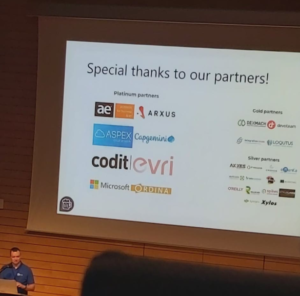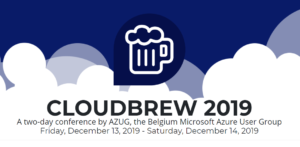CloudBrew 2019 was a two-day conference by AZUG, the Belgium Microsoft Azure User Group, that took place in Mechelen on December 13 and 14. Devoteam was Gold Sponsor. The conference was first held in 2013 and revolves around cloud technologies and Microsoft Azure. Over the years, the conference grew, and this edition included a vast variety of topics regarding Azure and other cloud technologies, such as moving data around in Azure, Infrastructure as Code 2.0 and Azure messaging. Devoteam’s Microsoft Cloud Infrastructure consultants Vincent Janssen, Jim Leclercq and Henri Geimer attended the event. In this blog post, they share their experiences and highlights.
Location
The event took place at the Lamot Conference and Heritage Centre in the heart of Mechelen, near the Dyle’s riverbank. Being a huge fan of modern architecture, the location is just gorgeous! The former brasserie, where Lamot beer was produced until the eighties, has been completely renovated. The new architecture mixes both modernity and personality. You can also admire the old copper fermentation tanks that were used to produce the beer in the old days. This fits perfectly with the name of the event, CloudBrew.

Break-out sessions
 We attended different sessions presented by awesome people. Various topics were discussed, from implementing governance and creating policies for Azure to processing Big Data from IoT devices using IoT Hub and Data Lakes.
We attended different sessions presented by awesome people. Various topics were discussed, from implementing governance and creating policies for Azure to processing Big Data from IoT devices using IoT Hub and Data Lakes.
There were about forty sessions spread over two days, between 9 am and 5 pm. Given the amount of very interesting sessions, we decided to focus on Identity Management, Security, Networks in Azure, As Code or Infrastructure as Code (IaC).
At the start of the conference, we attended a pleasant presentation from Alex Mang, who came from Romania. He told us the story of CloudBrew, and the history of Azure since its creation back in 2010. It was interesting to get some back-in-the-day facts on the service and insights on Microsoft’s ambitions for the future.
After this session, Karim Vaes, a Microsoft Product Specialist, presented a use case about Connected Cars using Azure services for analytics. This session fitted perfectly in the Big Data, AI and Machine Learning initiative of Devoteam.
Later we went to Karl Ots’ presentation about Azure Policies and RBAC governance. We talked to him afterwards, to get some advice on what we could improve at work on a daily basis.
What we really appreciated was to be able to exchange our experiences and knowledge over a drink in a warm atmosphere with speakers and other participants.
At noon, we could enjoy some tasty food, ranging from sushi’s to smoked salmon and pasta. And of course, taste some beers!
We also attended the session of Mohamed Wali, which was about spanning cloud services across Amazon Web Services (AWS) and Azure. He shared with us his methods of implementing Single Sign On (SSO) between the two cloud providers, but also multiple ways of backing up our environments using their services together.
Next to that, we attended two security sessions of our German colleague and MVP Tom Janetscheck who showed a live demo which simulated hacking and the anticipation of Microsoft’s security services.

Overall, the different sessions were rich in content, we especially improved our knowledge about Azure Blueprint, Security and Networking in Azure.
A real added value was the field experience and the tips & tricks that were presented. Through concrete cases, the presenters listed the constraints, but also elaborated on how the team was able to face and solve the different issues encountered. For example, during a session on IaC, we learned that the company Maersk, which manages more than a million physical containers and of which critical application updates are a real challenge, decided to use Hashicorp tools by combining them with Microsoft Azure tools. This to automate the entire process of updating applications and to increase security, by restricting access to the production infrastructure to all users. Access to the production environment is only managed by a series of automated processes.
To conclude
The conference in total was interesting, because most presentations covered real use cases which are relevant at most of our customers. It made us acquire more knowledge, that will be beneficial for our clients.
Personally, we took great pleasure in attending these two days of knowledge sharing, during which we reinforced our competences in Azure, especially on governance, security, network or infrastructure as code. Not to forget that we got a brilliant overview of the different solutions that can be used in a small or large structure and we’re convinced that for the year 2020 the best is yet to come.
Of course, we also enjoyed networking with our peers and colleagues in a less formal way than at the office.
Hope to see you at the next edition of CloudBrew on December 10 and 11, 2020!
If you are interested in Hybrid Cloud, DevOps, Cloud Governance or other cloud related technologies, don’t hesitate to contact Joey Bergen, our practice manager Microsoft Cloud Infrastructure, via phone or email.
